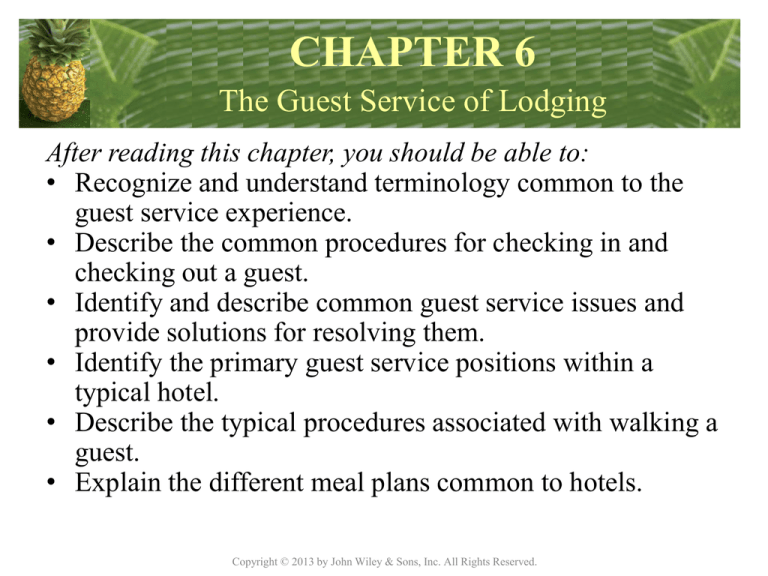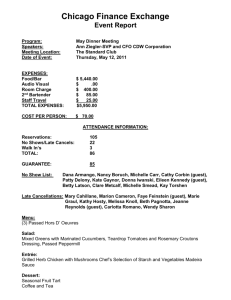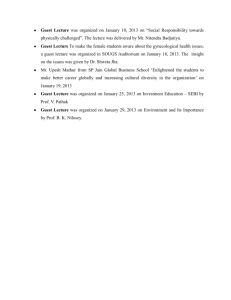
CHAPTER 6
The Guest Service of Lodging
After reading this chapter, you should be able to:
• Recognize and understand terminology common to the
guest service experience.
• Describe the common procedures for checking in and
checking out a guest.
• Identify and describe common guest service issues and
provide solutions for resolving them.
• Identify the primary guest service positions within a
typical hotel.
• Describe the typical procedures associated with walking a
guest.
• Explain the different meal plans common to hotels.
Copyright © 2013 by John Wiley & Sons, Inc. All Rights Reserved.
Service Positions
• Porter
–
–
–
–
–
–
–
–
–
–
–
–
Also known as a bellman or a bellhop.
Predominantly male, but can be held by either gender.
Typically the first contact of the hotel.
Greets guests as they enter
Holding/monitor the door.
Serves as the first line of defense for security.
Gatekeeping
Transporting/storing/receiving luggage
Directing crowd flow
Acting as concierge/problem solver
Acting as valet
Directing cabs
Copyright © 2013 by John Wiley & Sons, Inc. All Rights Reserved.
Front Desk
• The importance of the front desk cannot be understated.
• Most everyone must come in contact with these workers.
• They are the main contact during the entire stay.
Photo courtesy of S. Markham.
Copyright © 2013 by John Wiley & Sons, Inc. All Rights Reserved.
Front Desk (cont’d)
• Issues:
– Impolite guests
– Missed guests’ needs
– Missing reservations
– Wrong key
– Nonworking key
– Room occupied
– Lines too long
– Missed something held for guest
– Credit card not verified
– Luggage sent to wrong room
– Rates do not match previous quote or are not available
– Room is not what they expected
– Wrong information regarding area or hotel
– Unclean room
– Room deficiencies
Copyright © 2013 by John Wiley & Sons, Inc. All Rights Reserved.
Checking in a Guest
• Check-in procedures differ from property to property, but
the basics are essentially the same.
– Greet the guest with a smile and a warm welcome.
– Ask if they have a reservation
• (verify name and check identification).
– Ask them to fill out a guest registration form
• (number of people, type of room, length of stay).
– Ask about any preferences.
– Establish the form of payment and give a quote.
– Ask for a credit card for incidentals.
Copyright © 2013 by John Wiley & Sons, Inc. All Rights Reserved.
Rates
• Usually the first question from a guest.
• Some hotels have meals included in their rates.
– Inform of policies such as check out, deposits, and
billing procedures.
– Assign their room.
– Write down the room number on card with their room
keys and present it to them.
Copyright © 2013 by John Wiley & Sons, Inc. All Rights Reserved.
Checking Out
• Checking out a guest may be automatic, but the manual procedure is
typically as follows:
– Greet with a warm welcome.
– Ask the room number.
– Ensure that everything is posted to the folio.
– Ask if there were any recent charges that may not have been
posted.
– Ask how everything was during their stay.
– Be as brief as possible. People typically want to get somewhere.
– Present charges
• Many establishments place under guest’s door after night
audit.
– Verify how to pay.
• This is typically on the credit card that is being held.
– Collect the keys.
– Thank them. Ask them to return at a later date.
– Ask if they need directions or assistance with bags, etc.
Copyright © 2013 by John Wiley & Sons, Inc. All Rights Reserved.
Podiums/Pods
• Relatively new way of accommodating guests.
• Replace a large front desk with small, individual stations.
• Breaks down the barriers between the guests and the
front-desk agents.
• Easier for handicapped guests.
• Can also be used in addition to the front desk or auxiliary
areas.
Copyright © 2013 by John Wiley & Sons, Inc. All Rights Reserved.
Dealing with
Front Desk Issues
•
•
•
•
•
•
If Busy
Declined Credit Cards
Missing Reservations
Walking a Guest
Giving Information or Directions
Surveying the Stay
Photo courtesy of S. Markham.
Copyright © 2013 by John Wiley & Sons, Inc. All Rights Reserved.
Back Office
• Is a part of the hotel that is typically directly in back of
the front desk.
• Is the support area for guest services.
• Management typically has its offices there.
• Entry and mid-level managers are directly involved with
guest service.
• Upper level managers periodically greet guests, but
primarily concentrate on oversight of the property.
Copyright © 2013 by John Wiley & Sons, Inc. All Rights Reserved.
Concierge
• Assists guests with both hotel and non–hotel-related
matters
– Involves everything from making dinner reservations
in the local area to directions to a shopping center
– Has full knowledge of the hotel services as well as the
local area
– Assesses the needs of the guest and makes appropriate
suggestions
– “Pulls strings” and makes the guest experience extra
special through their advice and services
– Recently facilitated with technology
Copyright © 2013 by John Wiley & Sons, Inc. All Rights Reserved.
Housekeeping
• Housekeeping
– The heart of the hotel
– Vital
– Invisible department to the guest until something goes
wrong
• Turndown Service
– Closing of draperies
– Turning down the lights
– Playing of softer music or other music specified in the
guest’s profile
– Folding the top corner of the bedspread away from pillow
– Placing chocolates or mints on the bed
– If children are present, teddy bears might be tucked in and
books are often set out
Copyright © 2013 by John Wiley & Sons, Inc. All Rights Reserved.
Discussion Questions
1. How does the concierge help the guest service experience?
2. List and provide solutions for three common front-desk
issues.
3. What is “walking a guest,” and why is it done?
4. List the procedures common to checking out a guest.
5. What is the difference between EP, AP, and MAP?
6. Why might it be helpful to consider your grandmother
visiting when relating to hotels?
7. Should housekeepers acknowledge the guest?
8. After reading the feature about Mr. Hostettler, how would
you describe his idea and importance of a “brand”?
Copyright © 2013 by John Wiley & Sons, Inc. All Rights Reserved.



